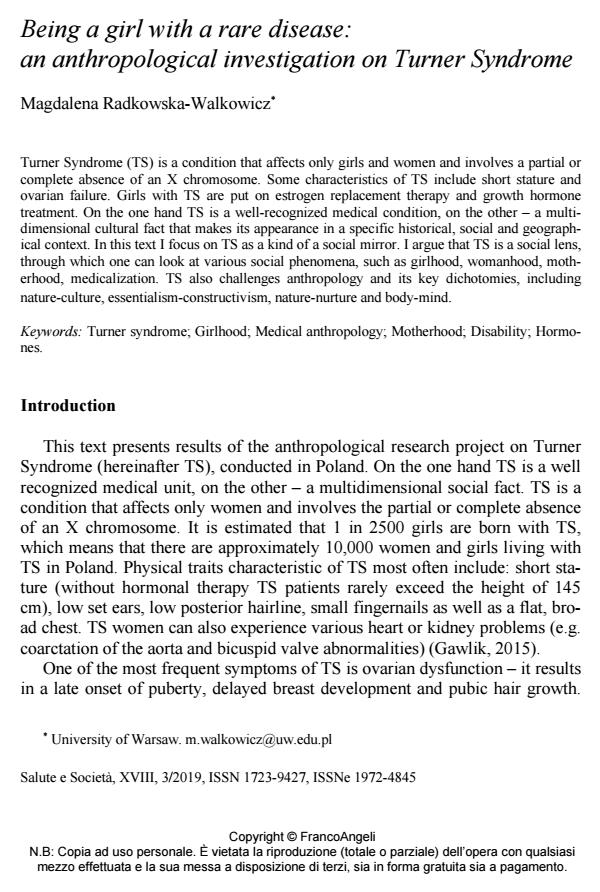Being a girl with a rare disease: an anthropological investigation on Turner Syndrome
Titolo Rivista SALUTE E SOCIETÀ
Autori/Curatori Magdalena Radkowska-Walkowicz
Anno di pubblicazione 2019 Fascicolo 2019/3 Lingua Inglese
Numero pagine 13 P. 94-106 Dimensione file 150 KB
DOI 10.3280/SES2019-003009
Il DOI è il codice a barre della proprietà intellettuale: per saperne di più
clicca qui
Qui sotto puoi vedere in anteprima la prima pagina di questo articolo.
Se questo articolo ti interessa, lo puoi acquistare (e scaricare in formato pdf) seguendo le facili indicazioni per acquistare il download credit. Acquista Download Credits per scaricare questo Articolo in formato PDF

FrancoAngeli è membro della Publishers International Linking Association, Inc (PILA)associazione indipendente e non profit per facilitare (attraverso i servizi tecnologici implementati da CrossRef.org) l’accesso degli studiosi ai contenuti digitali nelle pubblicazioni professionali e scientifiche
Turner Syndrome (TS) is a condition that affects only girls and women and involves a partial or complete absence of an X chromosome. Some characteristics of TS include short stature and ovari-an failure. Girls with TS are put on estrogen replacement therapy and growth hormone treatment. On the one hand TS is a well-recognized medical condition, on the other - a multi-dimensional cultural fact that makes its appearance in a specific historical, social and geographical context. In this text I focus on TS as a kind of a social mirror. I argue that TS is a social lens, through which one can look at various social phenomena, such as girlhood, womanhood, motherhood, medicaliza-tion. TS also challenges anthropology and its key dichotomies, including nature-culture, essential-ism-constructivism, nature-nurture and body-mind.
Keywords:Turner syndrome; Girlhood; Medical anthropology; Motherhood; Disability; Hormones.
- Barad K. (2007). Meeting the Universe Halfway: Quantum Physics and the Entanglement of Matter and Meaning. Durham, London: Duke University Press Books.
- Beauvoir S. de (1971). The Second Sex. New York: Alfred A. Knopf.
- Budrowska B. (2000). Macierzyństwo jako punkt zwrotny w życiu kobiety. Wrocław: Funna.
- Butler J. (1999). J. Gender Trouble: Feminism and the Subversion of Identity. New York: Routledge.
- Coole D., Frost S. (2010). New Materialisms. Durham, London: Duke University Press.
- Foucault M. (1973). The Birth of the Clinic. New York: Pantheon Books.
- Gawlik A. (2015). Management of Turner Syndrome. European Endocrinology 11(2):100-1. DOI: 10.17925/EE.2015.11.02.10
- Good B.J. (1993). Medicine, rationality, and experience. An anthropological perspective. Cambridge: Cambridge University Press.
- Goodley D. (2011). Disability Studies. An Interdisciplinary Introduction. London: Sage.
- Greer G. (1991). The Change. Women, Aging, and the Menopause. London: Hamish Hamilton.
- Hong D., Kent J.S., Kesler S. (2009). Cognitive profile of Turner Syndrome. Developmental Disabilities Research Reviews, 15(4): 270-278.
- Irni S. (2013). Sex, Power and Ontology: Exploring the Performativity of Hormones. NORA – Nordic Journal of Feminist and Gender Research, 21(1): 41-56. DOI: 10.1080/08038740.2012.75724
- James A., Hockey J. (2007). Embodying Health Identities. Basingstoke: Palgrave Macmillan.
- Kastrup K.W. (2009). Turner syndrome in childhood. In: Gravholt C.H., editor, Turner – Know Your Body! An information book on Turner Syndrome. Gothenburg: Nordisk.
- Kleinman A. (1988). The illness narratives: Suffering, healing, and the human condition. New York: Basic Books.
- Krawczak A. (2019). Zespół Turnera. Macierzyństwo w planach. In: Maciejewska-Mroczek E., Radkowska-Walkowicz M., Reimann M., editors, Zespół Turnera. Głosy i doświadczenia. Warsaw: Oficyna Naukowa.
- Kucharska A. (2019). Zespół Turnera – aspekty medyczne. In: Maciejewska-Mroczek E., Radkowska-Walkowicz M., Reimann M., editors, Zespół Turnera. Głosy i doświadczenia. Warsaw: Oficyna Naukowa.
- Lagrou K., Froidecoeur C., Verlinde F., Craen M., De Schepper J., François I., Massa G., Belgian Study Group of Paediatric Endocrinology (2003). Psychosocial Functioning, Self-Perception and Body Image and Their Auxologic Correlates in Growth Hormone and Oestrogen-Treated Young Adult Women with Turner Syndrome. Hormone Research, 66(6): 277-284. DOI: 10.1159/00009554
- Maciejewska-Mroczek E. (2019). O (nie)pewności choroby. Narracje matek mających córki z Zespołem Turnera. In: Maciejewska-Mroczek E., Radkowska-Walkowicz M., Reimann M., editors, Zespół Turnera. Głosy i doświadczenia. Warsaw: Oficyna Naukowa.
- Marcus G. (1995). Ethnography in/of the World System. The Emergence of Multi-Sited Ethnography. Annual Review of Anthropology, 24: 95-117.
- Radkowska-Walkowicz M. (2019). Nikt nie rodzi się kobietą? Zespół Turnera i zwierciadła kobiecości. In: Maciejewska-Mroczek E., Radkowska-Walkowicz M., Reimann M., editors, Zespół Turnera. Głosy i doświadczenia. Warsaw: Oficyna Naukowa.
- Rajtar M. (2019). Bioetyka i technologie wzmacniania ludzkiego ciała w kontekście doświadczeń kobiet z Zespołem Turnera. In: Maciejewska-Mroczek E., Radkowska-Walkowicz M., Reimann M., editors, Zespół Turnera. Perspektywa antropologiczna. Warsaw: Oficyna Naukowa.
- Roberts C. (2007). Messengers of Sex: Hormones, Biomedicine, and Feminism. New York: Cambridge University Press.
- Schier K. (2009). Piękne brzydactwo. Psychologiczna problematyka obrazu ciała i jego zaburzeń. Warsaw: Scholar.
- Skuse D. (2009). Psychological and Psychiatric Aspects of Turner Syndrome. In: Gravholt C.H., editor, Turner – Know Your Body! An information book on Turner Syndrome. Gothenburg: Novordisk.
- Sutton E.J., McInerney-Leo A., Bondy C.A., Gollust S.E., King D., Biesecker B. (2005). Turner syndrome: four challenges across the lifespan. American Journal of Medical Genetics, 139A(2): 57-66.
- Świątkiewicz-Mośny M. (2010). Tożsamość napiętnowana. Socjologiczne stadium mechanizmów stygmatyzacji i autostygmatyzacji na przykładzie kobiet z zespołem Turnera. Kraków: Nomos.
- Teilman G., Holm K. (2009). Chronic disease in adolescents. In: Gravholt C.H., editor, Turner – Know Your Body! An information book on Turner Syndrome. Gothenburg: Novonordisk.
- ‘Should I Buy Her a Doll’? Motherhood and Turner Syndrome in Poland Magdalena Radkowska-Walkowicz, Ewa Maciejewska-Mroczek, in Medical Anthropology /2023 pp.177
DOI: 10.1080/01459740.2023.2170797
Magdalena Radkowska-Walkowicz, Being a girl with a rare disease: an anthropological investigation on Turner Syndrome in "SALUTE E SOCIETÀ" 3/2019, pp 94-106, DOI: 10.3280/SES2019-003009